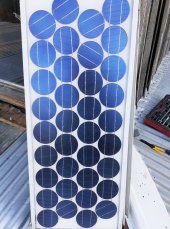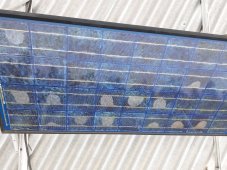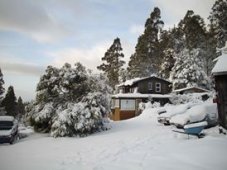Xenos
New Member
- Joined
- Mar 14, 2022
- Messages
- 31
Hi, I stumbled across this DIY forum and at last I may be able to sort out a few solar questions in the future. I live in Southern Tasmania.
I have 6 mismatched solar panels totalling about 420 watts which I know shouldn't be done but it works for the moment. I get about 20 amps when the sun is shining . I really need to change at least 4 and buy 3 more 100 watt to match up with my 2 latest 100 watt Renogy. The three Solarex 60 watt panels I've been using for 32 years and cost and arm and a leg back then, $600 each. The 4th is a Solarex 40? watt that's 38 years old, an ex Telecom solar radio phone panel that the lads left me when they upgraded the Telcom systems together with 2 six volt sealed batteries that weigh a ton. . This ancient panel still gives a modest 2.39Amps. The solar array goes through my latest acquisition a Renogy 40 amp solar controller/regulator. and then to another acquisition a single 300aH ATG LiFPO4 battery. Today I've attached a 32Amp 400V DC circuit breaker to the solar array. The battery has a monitor and a circuit breaker built into a case holding the battery. I'm about to add a 40 amp bolt on midi fuse to the load side.
I'm so happy that this newish system can now run my satellite internet plus the usual lights and telly.
Photos. 40 watt Solarex panel and Solarex 60 watt . Note the brown staining on the 60 watt panel.
Any ideas what causes this staining? Only one of the 3 has it.


I have 6 mismatched solar panels totalling about 420 watts which I know shouldn't be done but it works for the moment. I get about 20 amps when the sun is shining . I really need to change at least 4 and buy 3 more 100 watt to match up with my 2 latest 100 watt Renogy. The three Solarex 60 watt panels I've been using for 32 years and cost and arm and a leg back then, $600 each. The 4th is a Solarex 40? watt that's 38 years old, an ex Telecom solar radio phone panel that the lads left me when they upgraded the Telcom systems together with 2 six volt sealed batteries that weigh a ton. . This ancient panel still gives a modest 2.39Amps. The solar array goes through my latest acquisition a Renogy 40 amp solar controller/regulator. and then to another acquisition a single 300aH ATG LiFPO4 battery. Today I've attached a 32Amp 400V DC circuit breaker to the solar array. The battery has a monitor and a circuit breaker built into a case holding the battery. I'm about to add a 40 amp bolt on midi fuse to the load side.
I'm so happy that this newish system can now run my satellite internet plus the usual lights and telly.
Photos. 40 watt Solarex panel and Solarex 60 watt . Note the brown staining on the 60 watt panel.
Any ideas what causes this staining? Only one of the 3 has it.






